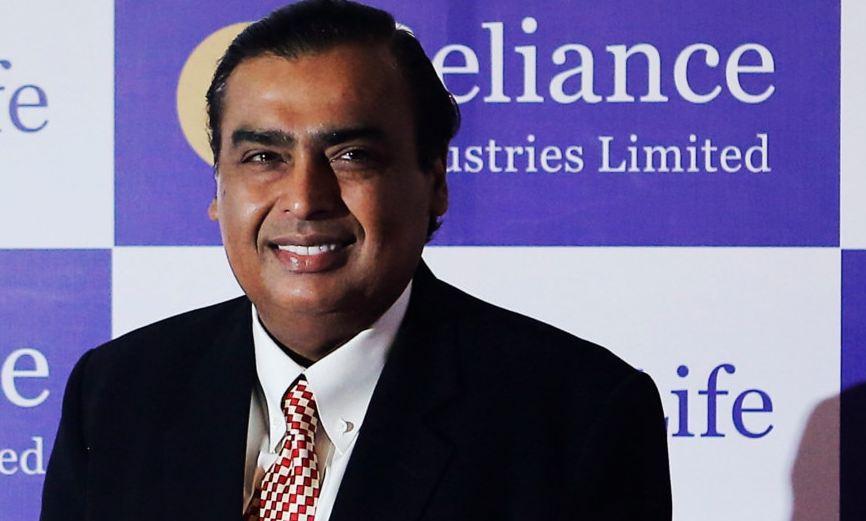Did the Government Help Reliance Industries Raise Rs 53,000 crore?

Representational image. | Image Courtesy: wealthypersons.com
Mumbai/Delhi, June 7, 2020: The “largest-ever” rights issue of shares by India’s biggest private corporate entity, Reliance Industries Limited (RIL), closed on June 3, having been over-subscribed by 1.59 times of the announced value of Rs 53,124 crore. RIL will receive this amount from its shareholders after it receives the full pay-out from subscribers to its rights issue scheduled for the end of 2021.
As the authors explained in a previous article for NewsClick on May 20, RIL’s rights issue was perhaps the most important part of the company’s strategy to raise enough capital to pay off its growing debt. In August 2019 the country’s richest man, Mukesh D. Ambani, had announced a plan to make the company he heads “debt-free.”
After large elements of the capital-raising plan fell through –– notably a planned investment of around US$ 15 billion into RIL’s crude oil refining and petrochemicals business by Saudi Arabia’s Aramco –– in the months that followed, the company found a way around the hurdles by raising capital through investments in its telecommunications and mobile internet data business, Reliance Jio.
Investments announced over the past two months into Reliance Jio of Rs 43,574 crore by social media giant Facebook Inc. and Rs 22,620 crore by three US-based private equity firms (Vista Equity Partners, Silver Lake and General Atlantic) preceded the rights issue by RIL, that opened on May 20.
Amazing Fund-Raising Spree
RIL’s stunning capital-raising spree continued while its rights issue was on. Two more investment intentions by foreign companies took place. The first, by the US based private equity firm KKR, was announced on May 22. This deal is worth Rs 11,367 crore for a 2.32% stake in Jio Platforms, an RIL subsidiary that owns Reliance Jio.
The second, announced on June 5, is by an Abu Dhabi state investment fund named Mubadala Investment Company. This investment, worth Rs 9,093.6 crore, is to acquire a 1.85% stake in Jio Platforms. Two days earlier, on June 3, NDTV had stated that two more West Asian sovereign wealth funds are in advanced talks to invest in Jio Platforms –– Abu Dhabi’s Investment Authority and Saudi Arabia’s The Public Investment Fund, citing sources familiar with the deals.
Other reports have indicated that RIL is planning to list the shares of Reliance Jio on stock markets abroad, after Union Minister for Finance and Corporate Affairs, Nirmala Sitharaman, announced at a media conference on May 17, that the government had decided to allow Indian companies to list their stocks overseas.
Thereafter, late on Friday June 5, Reuters reported that one of the three American investors, Silver Lake, will invest an additional $601.4 million or Rs 4,546 crore, in Jio Platforms, which houses RIL’s telecom wing Jio Infocomm and its music and video streaming applications, thereby raising its enterprise value to Rs 5,16,000 crore. Silver Lake’s holding in Jio Platforms would thus go up from just over 1% to a bit more than 2%.
The California-based private equity firm Silver Lake, with assets of around $40 billion, has invested in several major information technology companies including Airbnb, Alibaba, Alphabet (the parent company of Google, YouTube and Android), Twitter, Dell Technologies and the movie theatre chain AMC Entertainment Holdings.
The deal is the latest in a string of fund-raising activities aimed at paring RIL’s net debt of $21.4 billion. Reuters had earlier reported that RIL planned “to wrap up the bulk of its private fundraising by the third quarter before exploring a 2021 public listing in the United States, where it is eyeing a valuation of $90 billion to $95 billion for Jio Platforms.”
Taken together with the rights issue, the company will eventually raise over US $20 billion, which is equivalent to over Rs 1.50 lakh crore, at currently prevailing exchange rates. All these fund-raising schemes may have been planned earlier but were executed during the months that India was locked down due to the COVID-19 pandemic.
Mukesh Ambani said he saw the success of the rights issue as a “vote of confidence, by both domestic investors, foreign investors and small retail shareholders, in the intrinsic strength of the Indian economy.”
In this article we analyse what has not been reported so far, namely, how this “vote of confidence” was preceded by a similar ‘vote of confidence’ in the country’s richest man, and RIL, by various ministries and agencies of the Indian government, whose actions facilitated the rights-issue.
Changes in Rules by the Government
RIL announced its rights issue on May 16. Interestingly, the announcement came less than a fortnight after the Securities and Exchange Board of India (SEBI) and the Union Ministry of Corporate Affairs (MCA) announced crucial relaxations in the regulatory requirements for companies intending to conduct such a rights issue of shares.
SEBI, the regulator of the country’s financial markets, announced on May 6 that it had relaxed certain compliance requirements for rights issues. Specifically, it said that the announcement and advertisement of a rights issue could be conducted entirely through the means of electronic media –– online and on television –– and that no physical notice by means of Registered Post, Speed Post or a courier service was required.
This was a “one-time” relaxation of its “issue of capital and disclosure requirements,” that usually requires such a physical notice to be given by a company before conducting a rights issue. SEBI declared it was granting this relaxation in view of the social-distancing requirements during the all-India lockdown due to the COVID-19 pandemic.
Less than a week later, on May 11, the MCA released a circular validating SEBI’s declaration. MCA’s circular announced that the ministry had received “several representations...for providing clarification on the mode of issue of notice...for rights issues by listed companies.”
The circular clarified that rights issues that were opening till July 31, 2020, and which complied with SEBI’s May 6 announcements, would be permitted, and would not be considered a violation of the Companies Act, 2013.
On May 17, Finance Minister Sitharaman, announced the same relaxations in a media conference on the government’s “relief package” of economic measures. She announced that the MCA was allowing rights issues to be conducted digitally as part of the “timely action to reduce (the) compliance burden under various provisions of (the) Companies Act.”
It appears that the only company to have benefitted from these changes in rules so far, is RIL.
Business Standard has reported that Reliance Jio is considering Nasdaq, a stock market in the United States, as the venue for its listing. Helpfully, the MCA permitted precisely this, with Sitharaman announcing at the May 17 media conference that Indian companies were now permitted to directly list their securities in permissible overseas jurisdictions.
(Nasdaq, an acronym for National Association of Securities Dealers Automated Quotations System, is an electronic exchange where stocks are traded through an automated network of computers instead of a trading floor. It is the world’s second-largest stock exchange in terms of market capitalisation.)
On June 3, one of the authors of this article (Paranjoy) emailed a questionnaire to Finance Minister Sitharaman, with copies to Finance Secretary Ajay Bhushan Pandey and the Secretary, Company Affairs, Injeti Srinivas, and the official spokespersons of the Finance Ministry in the government’s Press Information Bureau. These were the six questions raised:
-
What representations from which companies and/or industry bodies did the MCA receive prior to its clarification on May 11 on delivery of notice to shareholders for rights issues?
-
It is alleged that only one company (Reliance Industries Limited) has benefitted from the MCA’s clarification. I solicit your comments.
-
What were the deliberative and consultative processes undertaken in the MCA and the Ministry of Finance (MoF) prior to permitting Indian companies to directly list their securities overseas? What representations and from which companies, industry bodies and/or advocacy groups were received by the two ministries?
-
Do the government’s decisions not show a lack of confidence in India’s stock exchanges?
-
At a time when the Indian government is attempting to build a robust environment within the country for rupee-denominated securities to be traded with liquidity on Indian bourses, would allowing Indian companies to list on overseas stock exchanges not dilute this policy?
-
Is allowing Indian companies to list their equity shares with greater ease a move towards full capital account convertibility?
The same day, a questionnaire was sent to Ajay Tyagi, Chairman, SEBI, with a copy to the head of the board’s communications division. The following is the text of the questionnaire:
“On May 6, 2020, the Securities and Exchange Board of India (SEBI) proposed a relaxation in pricing guidelines for preferential share allotments and exemptions for financial investors making an open offer for acquisition, in the case of investments in stressed companies. In a discussion paper issued on April 22 on the same subject, SEBI stated that it had ‘received numerous representations that the pricing guidelines for preferential allotment of shares were onerous for financial investors’.
In this regard, I seek your responses to the following questions for inclusion in an article I am writing.
-
What representations from which companies and/or industry bodies did SEBI receive prior to its proposal to relax the terms of its primary fund-raising norms by means of IPOs (initial public offerings) and rights issues on May 6, 2020?
-
Since the relaxations of May 6, which companies have conducted fund-raising exercises by means of rights issues and IPOs under the relaxed terms?
-
It is claimed that only one company (Reliance Industries Limited or RIL) has benefitted from SEBI’s relaxations. Is this correct? If yes, your comments are solicited.
-
Does SEBI feel it has enough teeth like the Securities and Exchange (SEC) of the United States in dealing with cases of fraud in the dealings of securities? In this context, has SEBI written to the government to enhance its quasi-judicial powers? And if yes, can this communication be shared?
-
RIL’s “Draft Letter of Offer” is not available on SEBI’s website. Was RIL exempted from filing a “Draft Letter of Offer” with SEBI for its recently concluded rights issue of shares?
-
SEBI, in its website, provides the filings of companies before they can issue rights shares. This is essentially a two-stage process: first a Draft Letter of Offer is filed with SEBI followed by the Final Letter of Offer which is filed with the stock exchanges. For example, in the case of Arvind Fashions Limited, the filing with SEBI was made on December 19, 2019 and the filing with the stock exchanges was made on May 11, 2020.
Does SEBI exempt large companies like RIL, while issuing rights shares, from filing with SEBI and allows them to directly file the Final Letter of Offer with the stock exchanges?”
Two identical questionnaires were emailed to the Managing Director and Chief Executive Officer of the National Stock Exchange, Vikram Limaye, and representatives of the exchange’s communications department, as well as to the CEO of the Bombay Stock Exchange, Ashish Chauhan. The following were the three questions asked:
-
The Union government has recently permitted sale of equity and debt instruments of Indian corporates through digital means. In addition, the government has permitted Indian companies to list their securities in foreign jurisdiction. What are your comments on these decisions?
-
Do the government’s decisions not show a lack of confidence in India’s stock exchanges?
-
At a time when the Indian government is attempting to build a robust environment within the country for rupee-denominated securities to be traded with liquidity on Indian bourses, would allowing Indian companies to list on overseas stock exchanges not dilute this policy?
Till the time of writing, the authors had not received any response from any of the persons to whom questionnaires had been emailed. This article will be updated as and when the responses come in.
Why the Rule Changes Now?
A former member of SEBI’s Primary Market Advisory Committee, speaking to NewsClick on condition of anonymity, asked what the need for the decision to allow rights issues to be conducted online taken at this juncture, when the country (and the world) is going through an unprecedented economic crisis that has devastated the lives and livelihoods of the underprivileged, was.
The person said: “This issue of allowing Indian corporates to sell their equity and debt instruments through digital means has been festering for many years –– in fact, a SEBI panel had put out a report recommending this move in December 2018. Different lobby groups have been discussing this topic for quite a few years. The question is not whether or not this is a good decision. The big question is ‘why now?’
“Should the government and the Finance Minister not be focussed on helping the poor? Is this not the need of the hour, instead of helping India’s largest private corporate entity?”
A market analyst, also speaking on the condition that he would not be identified, said that “at a time when the Indian government is attempting to build a robust environment within the country for rupee-denominated securities to be traded with liquidity on Indian bourses, wouldn’t allowing Indian companies to list on overseas stock exchanges not dilute this policy and does this not show a lack of confidence in Indian stock markets?”
Unlike deals that are called PIPE –– private investments in pubic equity –– in market parlance, the investments that have been made so far in Reliance Jio are in unlisted entities. “In many instances but not this one, these sort of investments in unlisted subsidiaries are announced only after they take place, that is, after the concerned investor has paid the money and the company has issued the shares,” the analyst pointed out.
He added that “RIL itself is currently in all probability ‘net free cash flow negative’ with an interest burden to service that is close to Rs 15,000 crore per year and which will start to seem very large, given that gross refining margins in the company’s Jamnagar refinery –– that has a high degree of operational complexity –– have fallen drastically over the past one year and most significantly in the recent quarter.”
Nevertheless, India’s biggest private company seems to have convinced its own shareholders and foreign investors that they have little to worry about even if the economy of the world is in terrible shape. The US-based investors are evidently of the view that their investments will not just be recouped but that they will earn handsome returns once Reliance Jio’s shares are listed on Nasdaq.
To be continued...
The writers are independent journalists. The views are personal.
Get the latest reports & analysis with people's perspective on Protests, movements & deep analytical videos, discussions of the current affairs in your Telegram app. Subscribe to NewsClick's Telegram channel & get Real-Time updates on stories, as they get published on our website.























